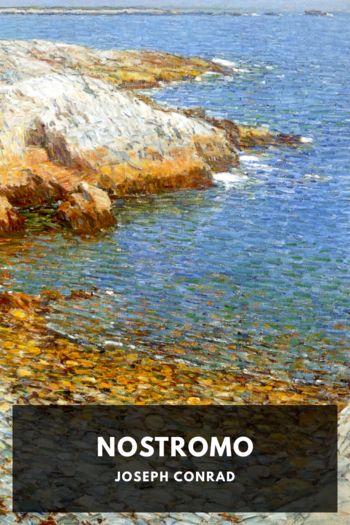Nostromo - Joseph Conrad (books to read fiction .TXT) 📗

- Author: Joseph Conrad
Book online «Nostromo - Joseph Conrad (books to read fiction .TXT) 📗». Author Joseph Conrad
The shores on the gulf are steep-to all round; three uninhabited islets basking in the sunshine just outside the cloud veil, and opposite the entrance to the harbour of Sulaco, bear the name of “The Isabels.”
There is the Great Isabel; the Little Isabel, which is round; and Hermosa, which is the smallest.
That last is no more than a foot high, and about seven paces across, a mere flat top of a grey rock which smokes like a hot cinder after a shower, and where no man would care to venture a naked sole before sunset. On the Little Isabel an old ragged palm, with a thick bulging trunk rough with spines, a very witch amongst palm trees, rustles a dismal bunch of dead leaves above the coarse sand. The Great Isabel has a spring of fresh water issuing from the overgrown side of a ravine. Resembling an emerald green wedge of land a mile long, and laid flat upon the sea, it bears two forest trees standing close together, with a wide spread of shade at the foot of their smooth trunks. A ravine extending the whole length of the island is full of bushes; and presenting a deep tangled cleft on the high side spreads itself out on the other into a shallow depression abutting on a small strip of sandy shore.
From that low end of the Great Isabel the eye plunges through an opening two miles away, as abrupt as if chopped with an axe out of the regular sweep of the coast, right into the harbour of Sulaco. It is an oblong, lake-like piece of water. On one side the short wooded spurs and valleys of the cordillera come down at right angles to the very strand; on the other the open view of the great Sulaco plain passes into the opal mystery of great distances overhung by dry haze. The town of Sulaco itself—tops of walls, a great cupola, gleams of white miradors in a vast grove of orange trees—lies between the mountains and the plain, at some little distance from its harbour and out of the direct line of sight from the sea.
IIThe only sign of commercial activity within the harbour, visible from the beach of the Great Isabel, is the square blunt end of the wooden jetty which the Oceanic Steam Navigation Company (the O.S.N. of familiar speech) had thrown over the shallow part of the bay soon after they had resolved to make of Sulaco one of their ports of call for the Republic of Costaguana. The state possesses several harbours on its long seaboard, but except Cayta, an important place, all are either small and inconvenient inlets in an iron-bound coast—like Esmeralda, for instance, sixty miles to the south—or else mere open roadsteads exposed to the winds and fretted by the surf.
Perhaps the very atmospheric conditions which had kept away the merchant fleets of bygone ages induced the O.S.N. Company to violate the sanctuary of peace sheltering the calm existence of Sulaco. The variable airs sporting lightly with the vast semicircle of waters within the head of Azuera could not baffle the steam power of their excellent fleet. Year after year the black hulls of their ships had gone up and down the coast, in and out, past Azuera, past the Isabels, past Punta Mala—disregarding everything but the tyranny of time. Their names, the names of all mythology, became the household words of a coast that had never been ruled by the gods of Olympus. The Juno was known only for her comfortable cabins amidships, the Saturn for the geniality of her captain and the painted and gilt luxuriousness of her saloon, whereas the Ganymede was fitted out mainly for cattle transport, and to be avoided by coastwise passengers. The humblest Indian in the obscurest village on the coast was familiar with the Cerberus, a little black puffer without charm or living accommodation to speak of, whose mission was to creep inshore along the wooded beaches close to mighty ugly rocks, stopping obligingly before every cluster of huts to collect produce, down to three-pound parcels of indiarubber bound in a wrapper of dry grass.
And as they seldom failed to account for the smallest package, rarely lost a bullock, and had never drowned a single passenger, the name of the O.S.N. stood very high for trustworthiness. People declared that under the Company’s care their lives and property were safer on the water than in their own houses on shore.
The O.S.N.’s superintendent in Sulaco for the whole Costaguana section of the service was very proud of his Company’s standing. He resumed it in a saying which was very often on his lips, “We never make mistakes.” To the Company’s officers it took the form of a severe injunction, “We must make no mistakes. I’ll have no mistakes here, no matter what Smith may do at his end.”
Smith, on whom he had never set eyes in his life, was the other superintendent of the service, quartered some fifteen hundred miles away from Sulaco. “Don’t talk to me of your Smith.”
Then, calming down suddenly, he would dismiss the subject with studied negligence.
“Smith knows no more of this continent than a baby.”
“Our excellent señor Mitchell” for the business and official world





Comments (0)